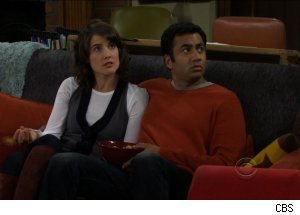 If Hollywood is an indicator of our most common fantasies, modern Americans want to sleep with their therapists. I am horrified that so many television shows and movies depict romantic relationships between therapists and clients as though they were perfectly normal! The truth is, romance within a therapeutic relationship is as far from normal, acceptable, healthy, and sane as you can possibly get.
If Hollywood is an indicator of our most common fantasies, modern Americans want to sleep with their therapists. I am horrified that so many television shows and movies depict romantic relationships between therapists and clients as though they were perfectly normal! The truth is, romance within a therapeutic relationship is as far from normal, acceptable, healthy, and sane as you can possibly get.
The writers of How I Met Your Mother currently have the character Robin dating her previous therapist. The relationship has been rationalized through a series of cutesy excuses: “Well, we only had a handful of therapy sessions … it hardly counted!” and, “Well, if we have a session where the previous client now becomes the therapist, it will all balance out!” ICK! In no way, shape, or form is dating a current or previous therapist healthy, ethical, or socially acceptable.
In California, there is a legal clause that states that a personal relationship between a previous therapist and client may be pursued two years after the termination of services. However, research tells us that the power imbalance remains strong, even after time has passed, and that romance in this situation is usually still emotionally damaging to the one who was the client. Hormones, brain chemistry, and emotional issues often inadvertently conspire to lead us toward unhealthy romantic choices, which is why therapists are clearly instructed that “Professional Therapy Never Includes Sex” (this is the name of a pamphlet that every single therapist-in-training in California receives on several occasions). Although specifics vary from state to state, 19 states have sexual exploitation laws forbidding therapists from engaging in sexual contact with clients.
Even though in the movie 50/50, Joseph Gordon-Levitt appears to find care, comfort, and I-don’t-know-what-else in the arms of his intern therapist (I don’t know because I walked out of the movie), your therapist is neither your caretaker nor your best friend. Your therapist can help you develop the skills you need to go out and make friends and find someone to help you through the difficulties of life. But if your therapist tries to convince you that his or her role is to love and protect you, run away! That is NOT appropriate therapy! And if he or she makes any sexually suggestive advances (verbal or physical), you know you are not working with an ethical therapist.
Extensive worldwide research and anecdotal evidence dating back to the origins of formalized therapy indicate that romantic relationships between therapists and their clients, regardless of which role is the initiator, are criminally damaging to the client in the majority of situations. The client is typically left with extreme emotional disruption, feelings of emptiness, isolation and guilt, and a tragically impaired ability to trust.
Certainly the therapeutic relationship is a unique situation wherein two human beings share space in a room while playing particular roles that ask them to maintain strict discipline of their human instincts, but to share the greatest level of openness and honesty imaginable. When deconstructed, the therapeutic hour shows itself to be a very bizarre social construct that is quite challenging to enact in a productive and healthy way. When properly delivered, the benefits of appropriate psychotherapy can be powerfully life-changing. However, there are many ways to get off track throughout the process, which is why therapists need to be well-trained, licensed, ethically and emotionally stable, grounded in common sense, and masters of self-discipline and self-care.
The boundaries around the therapeutic relationship are essential to the success and integrity of our profession, and I find it inexcusable for our entertainment industry to treat the subject matter so lightly and irresponsibly. We know that the mass public derives their sense of “normal” and desirable from the information presented on the screens in front of them. If this were an isolated incident of poor judgment, I could write it off as such. But the theme has become so ubiquitous as to appear in highly rated productions reaching tens of millions impressionable minds worldwide.
I started enjoying the recently cancelled sitcom, Free Agents, until the female character’s therapist asked her out during a session and they started dating. What? After a few therapy sessions, in which he did nothing of therapeutic value, he declared her problem-free and decided to hit on her. My concern is that the writers of these shows may actually be typical, regular people who truly believe that relationships with therapists are normal. If this storyline is depicted in other regular people’s everyday media consumption, a very serious misconception about the purpose and practice of psychotherapy may occur.
Of course, romantic, sexual, and loving feelings can arise between two people who sit close together and speak of personal and intimate issues on a regular basis. A well-trained and ethical therapist will seek professional consultation if romantic or lustful feelings arise and will follow wise counsel as to the most ethical way to proceed. Often these feelings can be worked through and resolved without any negative effect on the therapy. If the feelings persist, the responsible and legitimate therapist will control his or her impulses and refer the client to another professional. With the help of an esteemed consultant, they can determine how best to implement the transition with the client.
The therapist portrayed by Gabriel Byrne in In Treatment struggled with sexual feelings toward a client in the first season of the series. I have not seen these episodes, but I know the series is highly revered and often seen by the general public as an accurate representation of therapy. It was very disheartening for me to hear that this character acted on his sexual impulses, even though he apparently understood the harm that physical intimacy could do to his client. I think these representations are misguided and ill-advised, as they imply that the psychotherapeutic setting is always imbued with sexual energy and tension.
It is not uncommon for strong feelings to arise in a psychotherapy client. For many schools of thought, this is actually an important part of the therapeutic process. However, if the feelings become strong enough to breach the integrity of the therapy, they must be addressed. In the healthiest of situations, the client would admit these feelings to the therapist—the best therapeutic alliances are built on trust and acceptance, communicating to the client that no judgment or disgust will befall them in that room, under any circumstances. If a client shares the feelings he or she is having, the issue can be discussed openly and often can be resolved, bringing greater insight and personal power to the client. If the feelings cannot be redirected and resolved, it is best to help the client find a new therapist to continue the growth work in a nonsexualized setting.
Looking at current blog posts, I see many people justifying their seductions, romances, and friendships with their therapists. Most of these bloggers are writing at the beginning of their relationships and seem not to believe that they may not get a Hollywood ending. I am very concerned that media representations of our profession are casting a skewed and uninformed light on this very complex issue. The general public is clearly buying into the idea that dating their therapists may be legitimate.
Perhaps we therapists can take this challenge as an opportunity for greater enlightenment and education with our clients. It will keep us on our toes (even more) so that we may identify and address misplaced emotional feelings that arise in therapy. This aspect of the profession is difficult enough without added pressures from the mass media. However, our awareness of the issue can serve to reinforce our ethical stance and prepare us for any type of challenge that may walk through our consultation door.

The preceding article was solely written by the author named above. Any views and opinions expressed are not necessarily shared by GoodTherapy.org. Questions or concerns about the preceding article can be directed to the author or posted as a comment below.

 Sex, Gender, and Personal Identity Concepts
Sex, Gender, and Personal Identity Concepts 5 Lies People Learn from the Media about Therapy
5 Lies People Learn from the Media about Therapy Don't Underestimate Me: Ethical Use of Power for and with Children
Don't Underestimate Me: Ethical Use of Power for and with Children

